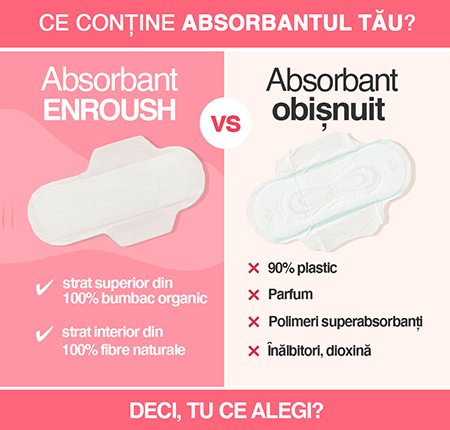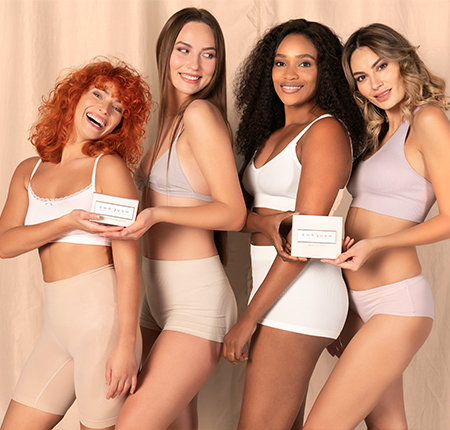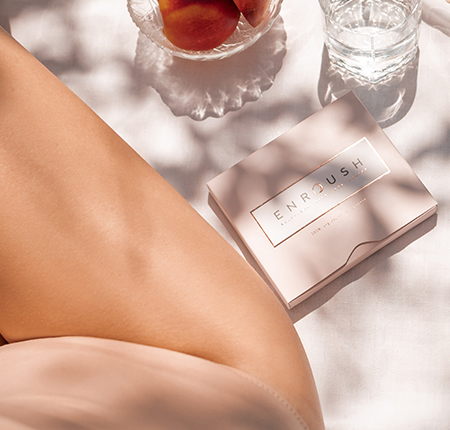
Organic absorbents - EVERYTHING you need to know
Are you one of the millions of women who prefer pads during menstruation? If your answer is yes, then you can enjoy a large number of benefits - both for your health and for the environment - if you make the switch from conventional absorbents to organic ones! Why is this happening? Today we're talking about all the benefits of these products to help you decide if you're okay with new ways to be sustainable (and comfortable) this time of the month. Read our article!
What are absorbents?
Before disposable pads came along, there were several options. The first reference to a menstrual product appears in Greece, c. X, described as "cloths of cotton or wool, rabbit fur, bundles of grass." Then, in the 1800s, both in Europe and the USA, most "menstrual cloths" were made at home, from various fabrics - hence the American euphemism "on the rag" (rag meaning cloth) appeared in the 19th century to describe one person per cycle. By the way, I wrote an article here about what people used on their periods before tampons.
Why choose organic?
If health is your main concern:
you will probably use at least 10,000 tampons or pads in your lifetime – in a very sensitive area. So it goes without saying that you might be concerned about the impact that regular absorbent pads might have on your health and your body.
If you are concerned about the ecological impact:
disposable pads will never be as good as reusable products. However, if you still want to use absorbent pads, there are a few reasons why organic pads are much more environmentally friendly than non-organic pads.
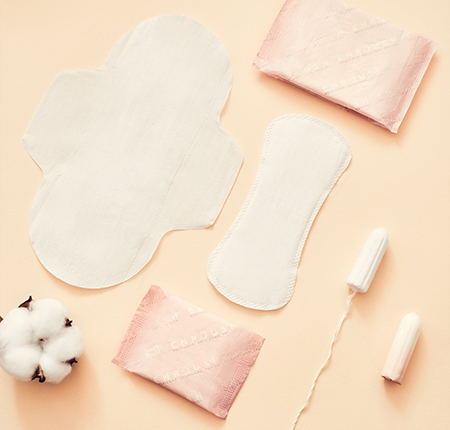
Good to know:
A truly organic absorbent pad is GOTS certified, which means that the cotton used is grown and manufactured in a specific way that does not use pesticides and is not bleached with chlorine.
An organic absorbent degrades in a few months, while a non-organic absorbent containing plastic in a few hundred years.
If you have sensitive skin and irritation problems (irritation, itching, allergies or rashes) when you switch to organic absorbents, you could get rid of these problems.
The problem with conventional menstrual products
There are a multitude of hidden chemicals and ingredients used in the manufacture of tampons and pads, and only recently has the world started talking about it. But things change!
Especially since waste is a huge problem with menstrual products. Studies show that a single woman will use between 5 and 15 thousand tampons and pads in her lifetime. That means a lot of plastic waste going straight to landfill.
Potential health impact
Only recently have we begun to look at the potential hidden health impact when using non-organic, conventional absorbents. Which is an important issue, as absorbents are in direct contact with your intimate area, so there is a high level of some potentially harmful ingredients being in a sensitive area. Here are some of those ingredients:
Phthalates
A study of several brands of menstrual products and diapers found high levels of phthalates in the products and concluded with a worrying statement. A considerable amount of phthalates is likely to be absorbed into the reproductive system.
Perfume
Perfume can contain thousands of chemicals, some of which are potentially harmful. Therefore, perfume has no place in any intimate hygiene product, although some already very well-known and popular brands use it frequently.
PESTICIDES
Conventionally grown cotton is grown with very high amounts of pesticides. These chemicals can stay on the cotton long after it has been harvested and end up in the absorbent pads you use month after month.
The advantages of organic cotton absorbents
Better for your body
Traditional absorbents contain chemicals called dioxins, created by the bleaching process used to make the material appear white. But exposure to these chemicals has been associated with a higher risk of cancer. According to the World Health Organization, dioxins can also cause hormonal problems, immune system problems, developmental problems, and reproductive problems, such as endometriosis , heavy periods, and even infertility. When you use menstrual products with dioxins, the tissues of your vagina and vulva can absorb these dangerous chemicals directly into your bloodstream. Fragrances and other chemicals in standard absorbents can also cause irritation, itching and redness.
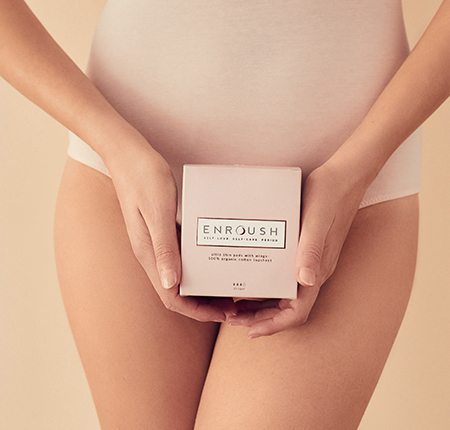
Organic absorbents are breathable
Unlike absorbents with synthetic fibers and plastic, organic cotton absorbents allow the skin to breathe while keeping the skin dry thanks to an absorbent cellulose core. This softer material also reduces the risk of allergies and skin irritations that can result from the plastic content of conventional absorbents. It can also lower the risk of bacterial and fungal infections that can result when the material doesn't allow your genital area to get enough air.
You are comfortable throughout the day
You probably already know that wet diaper feeling that regular absorbent pads can sometimes give you. That's because they are mostly made of plastic with little or no cotton content. The resulting fabric can feel rough on the skin and contribute to itching, burning and irritation. If a standard absorbent is uncomfortable for you, then organic cotton absorbents can be the perfect option to get rid of these unpleasant sensations. The good part is that you can wear them quietly during the day and at night.
Moreover, ENROUSH organic absorbents are ultra-thin, aerodynamic, invisible under clothes. The fins are also organic cotton, so they can prevent any unwanted leaks.
You protect nature and animals
Eco-friendly menstrual products like 100% organic cotton pads (such as ENROUSH) can have a serious positive impact on the environment. According to studies, non-organic absorbents take up to 800 years to fully decompose, compared to only 12 - 24 months for organic cotton products. In addition, growing organic cotton does not require pesticides that harm the native bees, birds and insects that play a significant role in our ecosystem.
Furthermore, organic absorbents use significantly less water and energy to manufacture than standard absorbents.
They are accessible
The cost of organic cotton pads is comparable to the cost of standard pads, without the potential skin irritation and environmental damage! Because organic cotton is so absorbent, many women have found that they use less product each period. Which makes organic cotton pads a much more cost effective solution to your monthly period routine!
Moreover, with the ENROUSH subscription we offer you a 20% discount on every order.
So, whether you're concerned about the environmental impact of your period, you're concerned about the impact of chemicals on your health, or you want to get rid of discomfort and irritation, you can try organic pads!
